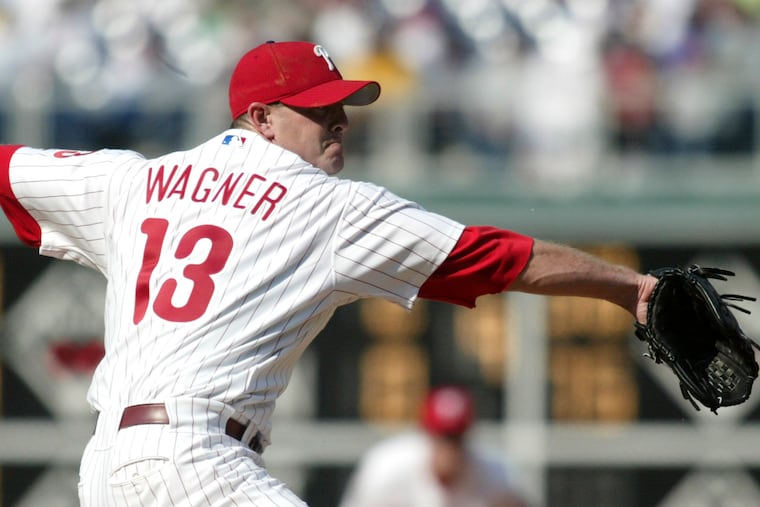Adrián Beltré, Joe Mauer, and Todd Helton elected to Baseball Hall of Fame; Billy Wagner falls just short
Wagner fell five votes shy of the three-quarters’ majority required for election. Chase Utley got 28.8% of the vote in his first year.

Given how Billy Wagner once dominated the ninth inning, it would’ve been poetic if the former Phillies closer got into the National Baseball Hall of Fame in his ninth year on the ballot.
Instead, he will have to wait. Again.
Adrián Beltré, Todd Helton, and Joe Mauer were elected Tuesday by voting members of the Baseball Writers’ Association of America, the Hall of Fame announced. Beltré was a landslide choice, picking up 95.1% of the 385 votes; Helton and Mauer received 79.7% and 76.1%, respectively.
» READ MORE: The 2024 Hall of Fame class: See how our writers voted and make your own picks
Wagner, meanwhile, came agonizingly close to the three-quarters’ majority required for election. At 73.8%, he would have reached the threshold with only five more votes.
Although it was likely small consolation to Wagner amid what has become an annual disappointment since 2016, he will almost certainly break through next year in his last appearance on the ballot. Since the Hall moved to annual voting in 1966, Curt Schilling is the only player to reach at least 70% of the writers’ vote and not get elected.
Wagner was among four former Phillies on the ballot. Chase Utley, in his first year on the ballot, debuted with 28.8% of the vote. Jimmy Rollins and Bobby Abreu each finished at 14.8% in their third and fifth years on the ballot, respectively. They will all return to the ballot next year.
Before that, Beltré and Mauer, first-time candidates, and Helton, in his sixth year on the ballot, will be inducted — with former manager Jim Leyland, who got voted in last month by a Hall of Fame era committee — on July 21 in Cooperstown, N.Y.
It marks the first time since 2019 that the writers elected as many as three players, including two on the first ballot.
Beltré's name was checked on all but 19 ballots, a plurality that represented the fourth-highest percentage among 19 third basemen in the Hall of Fame, trailing only George Brett (98.2% in 1999), Chipper Jones (97.2% in 2018), and Mike Schmidt (96.5% in 1995).
» READ MORE: Enjoying life in London, Chase Utley is proud of his career — whether he’s voted into the Hall of Fame or not
Inconceivable? Not when you consider his numbers and impact at a largely underrepresented position in Cooperstown.
Beltré, 44, finished with 3,166 hits, including 477 home runs, and five Gold Glove awards in 21 major-league seasons. When he signed with the Rangers before the 2011 season, he helped elevate them to back-to-back American League pennants in 2011-12.
If Beltré's credentials were unassailable, none of the other candidates was considered a slam dunk.
Helton, 50, built momentum over the last few years, going from 16.5% when he came on the ballot in 2019 to 72.2% last year. The former first baseman’s detractors believed his numbers were inflated from playing all of his 17-year career at elevation in Colorado. Ultimately, his career .316/.414/.539 slash line and 2,519 hits could not be ignored.
The knock on Mauer, 40, was the brevity of his peak caused by a series of concussions that forced him to move to first base. But he’s the only catcher to win three batting titles and was the best player at the most demanding position for nearly 10 years — all for his hometown Twins.
Players may stay on the ballot for 10 years as long as they keep getting at least 5% of the vote. Gary Sheffield racked up 63.9% and fell short in his 10th year, his candidacy now resting with one of the Hall’s era committees.
» READ MORE: Video: Is Jimmy Rollins a Hall of Famer?
Wagner, 52, has one more chance to avoid that fate. He posted a 1.86 ERA and 59 saves over two seasons with the Phillies (2004-05), a sliver of a 16-year career with five teams. He finished with 422 saves, sixth on the all-time list, a 2.31 ERA, and 11.9 strikeouts per nine innings.
But writers who have withheld their vote cite Wagner’s lack of innings (903) relative to contemporary Hall of Fame closers. Mariano Rivera, for instance, pitched nearly 1,300 innings; Trevor Hoffman nearly 1,100. Wagner also had a 10.03 ERA in the postseason.
And some voters are biased against closers. Only eight closers have been elected to the Hall of Fame.
Utley’s progression will be interesting to track. Among the 218 voters who made their ballots public before Tuesday night’s announcement, Utley received 39.4% of the vote. He didn’t do nearly as well with voters who kept their ballots private.
But Utley did outperform fellow second baseman Jeff Kent, who got only 15.2% when he debuted on the ballot in 2014. Kent stuck around all 10 years, topping out at 46.5% in his final appearance last year.
“I’m excited that we’re just having this conversation,” Utley told The Inquirer last week. “It’s a humbling experience to know that you’re on the ballot with some of the best players to have ever played, so I’m looking forward to kind of seeing how it all unfolds.”
» READ MORE: Chase Utley’s baserunning made him ‘The Man.’ Could it also make him a Hall of Famer?
Utley’s first time on the ballot didn’t do much to boost the candidacy of his longtime double-play partner. Rollins ticked up only slightly from 12.9% last year after getting 9.4% as a ballot rookie in 2022.
Voters are limited to a maximum of 10 selections per year. Next year’s ballot is expected to feature several solid first-time candidates, including Ichiro Suzuki, CC Sabathia, Dustin Pedroia, and Félix Hernández.